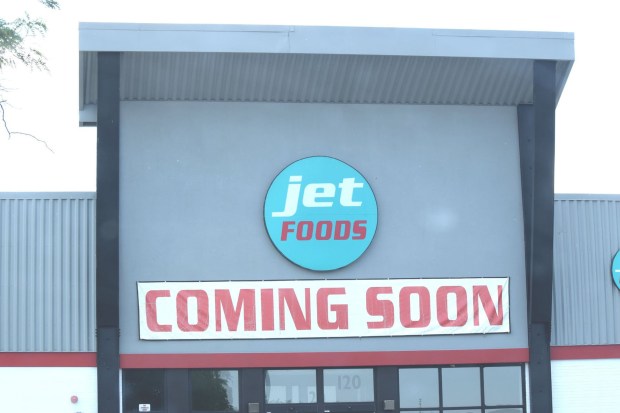Richton Park Mayor Rick Reinbold said he learned about the Save-A-Lot grocery closing when he went to shop and saw signs on the main entrance.
“There was a notice on the window saying that they were closing,” Reinbold said. “I would say I was in there at least once a week. It was just a very convenient location.”
The Save-A-Lot, 3736 Sauk Trail, closed Friday. The signs on the door encourage customers to visit the Save-A-Lot in at 3310 Chicago Road in Chicago Heights.
In Richton Park and Park Forest, officials say they are grappling with how to attract grocery stores. With the closure of Save-A-Lot, they want another grocery store to move into the area.
Elise Ziemann, who has lived in Park Forest for 20 years, said she was upset about the Save-A-Lot closing because Park Forest doesn’t have a grocery store and the Save-A-Lot was closest to her home.
Ziemann, whose partner Ben Armstrong travels on his bike to grocery shop because they don’t have reliable transportation, said the area needs a grocery store that sells fresh foods and is accessible to residents without vehicles.
“We want to go shopping in our town and support our town,” Ziemann said. “We need a grocery store. We need an appropriate store in the area.”
The Save-A-Lot opened in Richton Park 17 years ago and was a 15,000-square-foot facility anchoring a 30,000-square-foot commercial strip, according to a village news release.
Allen Enayatian, the property owner, said in 2021 Yellow Banana took over the Save-A-Lot chain. Yellow Banana decided to close its Richton Park location because of property taxes, he said.
Cook County came up with a program in the past year to give grocery store owners a property tax break if their store is located within a food desert, Reinbold said. Village officials told Yellow Banana about that program, but owners didn’t take advantage of it, he said.
“Unfortunately, they never pursued it. That particular program did require that they make an investment into the store, but would’ve helped substantially from the property tax perspective,” Reinbold said.
The Food Empowerment Project, a nonprofit organization focused on encouraging healthy food choices, defines food deserts as areas where access to affordable, healthy food options is restricted or nonexistent due to the absence of grocery stores within convenient traveling distance.
“I would say we do have a grocer in town, the Walmart location, so we do have one,” Reinbold said. “But unfortunately on the east side of town we don’t have access to grocery shopping. That area is a food desert, but we do have the availability of grocery shopping at the Walmart.”
Reinbold said village officials are optimistic another grocery store will open in the Sav-A-Lot space.
“My staff is already talking to a couple specialty grocers that are interested,” Reinbold said. “There is some interest. It’s very early, there’s no commitments yet, but we’re trying to connect the owner with these parties that are interested in doing something.”
The space is under the village’s town center commercial and mixed use district, Reinbold said. Village officials would only be able to influence which business opens in the space if it would require a zoning change, he said.
Richton Park officials would like to see a grocery store move into the space because it’s close to many apartments from where residents could easily walk to get groceries.
“I think it’s very important that we have a grocery store. That particular location, when it was built, probably back in the ’60’s, was a grocery store. There’s been, since then, a couple grocery stores in there,” Reinbold said.
In Park Forest, it has been a challenge maintaining a grocery store, said Mayor Joseph Woods. In recent years, Sterk’s Super Foods and Country Squire Foods closed, he said.
There was a plan worked on over three years to bring a grocery store to a barren 35,000-square-foot building on Orchard Drive, but the Jet Foods plan never materialized.
Signs announcing opening of Jet Foods on the 100 block of South Orchard Drive in Park Forest. (Penny Shnay)
When Sterk’s and Country Squire closed, Woods said, they told village officials the stores weren’t viable in Park Forest because of a low traffic count. Woods said he believes that’s a result of the village being insulated between towns with destination businesses.
“It’s a tricky situation in that we believe we need a grocery store, we had two grocery stores fail and corporate businesses are telling us there’s a low traffic count,” Woods said.
Park Forest officials are working to bring in larger businesses that would draw people and increase traffic counts at a potential grocery store, Woods said.
“It’s challenging, but we’re going to do our due diligence to communicate with businesses … to make them successful in Park Forest,” he said.
It is disappointing, Woods said, when grocery stores around Park Forest, like the Save-A-Lot, close because it expands the food desert, leaving fewer options to buy fresh foods.
“The cruel irony is that as the African American population of the south suburbs has increased, so has the vast food desert that affects our communities,” Woods said. “It is unconscionable that residents of our communities are forced to travel great distances for their food shopping, but those of other regions have a wide range of stores to choose from right in their backyards.”



